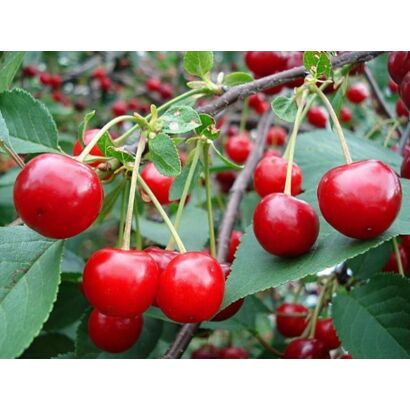Cherry Ural ruby
Variety: hybrid, self-fertile
Fruits: 3.5 gr., ruby.
Maturity: late, friendly
Yield: 6-10 kg/tree
Growing conditions: all regions
Selection: Ural
| Ripening period | Late-ripening variety |
| fruit size | Traditional varieties |
| Productivity: | high |
| Selection | Russia |
| planting material | Cherry |
The Ural ruby cherry variety was bred in 1954 by scientists of the Sverdlovsk Horticulture Breeding Station by crossing the "Ideal" cherry; with Michurin cultivars. In 1959, the variety was included in the State Register with permission to grow in all climatic zones.
Variety advantages: resistance to frost and drought, good adaptability, short stature of the bush, ease of care, suitable for industrial cultivation. Weaknesses: self-infertility, late ripening, technical grade.
Characteristics of the variety
Shrub undersized, up to 1.5 m. The crown is broadly rounded with drooping branches. Young shoots – green in color, becoming purple-brown with age. The foliage is obovate, the plate is smooth with serrated edges and a sharp end. Fruiting occurs on a one-year growth and bouquet branches.
Fruits rounded, uniform, weighing 3.5 g. Peel – smooth, dark red. Pulp and juice – red. The bone is small, well separated. Taste of berries – sweet and sour. The stalk is well attached to the fruits, so they do not crumble, even when they reach one hundred percent maturity.
Purpose. Ural Ruby Cherry – a technical variety, which, due to its modest taste, is not intended for fresh consumption. The berry is more often processed into juices, compotes, jams, etc. Also, the variety is used for breeding purposes as a carrier of strong properties, such as productivity, short stature, resistance to frost and drought.
Yield "Ural Ruby" medium – 6-10 kg per tree, 60-90 q/ha. Fruiting is annual, stable from 3 years after planting. Productive time for industrial cultivation 13-15 years, for private – 20-25 years old. After its expiration, the yield decreases.
The ripening dates for cherries are late, the 2nd half of August. The harvest ripens amicably and gathers in one run, but friendly. Berries ripen at the same time, they can be harvested in one go. If you collect unripe cherries, the fruits will ripen during storage. An overripe berry is prone to cracking.
Immunity. The plant is moderately susceptible to coccomycosis and other fungal diseases. Rarely affected by cherry aphids and sawflies. Recommended preventive treatment of trees.
Growing conditions. Variety "Ural ruby" was created specifically for growing in the Siberian climate, resulting in a frost-resistant cherry (up to – 35 ° C) with late flowering. Trees hibernate under snow cover, are not afraid of spring frosts, adapt to any weather conditions. The variety is more productive in regions with a cool climate.
Culture – self-infertile. For cross-pollination, a tree needs neighboring cherries that grow no further than 40 m and bloom at the same time. In addition, the Ural Ruby can be planted as an excellent pollinator for almost all late cherry varieties.
Preparations
| Phase | Operation | Biopreparations | Comment |
|---|---|---|---|
| Pre-plant tillage | Disease treatment | SBT-Trichodermin TH82 | Fight against overwintering forms of pathogens 30-100 g/20 l of water per 1 weave |
| top dressing | SBT-Ekosoil | Stimulation of biological activity 50 g per 20 l of water / 1 weave |
|
| root formation | Disease treatment | SBT-Fitolek BS26 | Soaking the roots of seedlings Prevention of the development of a wide range of fungal diseases 60 g/10 l for 50 pcs. seedlings |
| SBT-Trichodermin TH82 | Prevention of the development of a wide range of fungal diseases. Soaking the roots of seedlings 60 g/10 l for 50 pcs |
||
| Bloom | Disease treatment | SBT-Trichodermin TH82 | Prevention of late blight, powdery mildew, root rot, gray mold, leaf spot 40 g/10 l per 100 m2 |
| SBT-Fitolek BS26 | Processing in the budding phase Prevention of powdery mildew, alternariosis, anthracnose, fomopsis, gray mold, curliness, septoria, tuberculariasis 40 g / 10 l per 1 weave |
||
| Pest control | SBT-Actaro E | Processing in the budding phase Control of pests weevils, bronzovka, mites, aphids, sawflies. 10 g/10 l per 1 weave |
|
| After harvest | Disease treatment | SBT-Trichodermin TH82 | Autumn processing Reducing the stock of overwintering forms of pathogens spraying 120 g per 10–15 liters per 1 weave |
